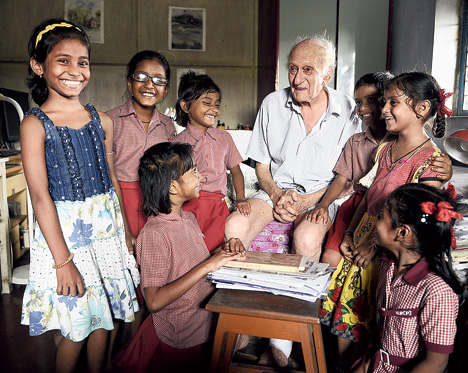
the organisation he had set up in 1980.
Calcutta: A jeep would stop on Nilmoni Mitra Street in Sovabazar. Jack Preger would climb down the stairs from his third-floor terrace room and travel to slums in Calcutta to talk to the residents and find out whether they were getting medicines.
"I studied medicine to work in Third World situations and this was the kind of work I wanted to do," the Oxford graduate and alumnus of the Royal College of Surgeons, Ireland, told Metro sitting in his one-room apartment in Sovabazar.
On Saturday, Preger was inducted into The Telegraph Education Foundation Hall of Fame 2018 at The TelegraphSchool Awards for Excellence 2018.
Barry O'Brien, convener of The Telegraph School Awards for Excellence, introduced the Briton who had settled in Calcutta in 1979 as "this crazy doctor actually goes out in search of his patients and when the police move his patients he goes out in search of where his patients have gone".
The 88-year-old, however, thinks he is not worthy of the award. "It is a matter of great pride to be inducted into The Telegraph Education Foundation Hall of Fame 2018 but it's not me alone but the people who have worked together," he told this newspaper.
Preger set up Calcutta Rescue in 1980 to "treat the sick and the injured where they lay, under bridges, on railway platforms and in drainage pipes". The organisation was registered much later, in 1991.

Preger would note down the names and details of "the destitute", write out the treatment they needed and visit a pharmacy near the Howrah bridge to buy the medicines. "The next day the medicines would be distributed. But then the police started to remove them from these locations and I couldn't find where they were," Preger recounted.
A priest in Middleton Row gave him a place to keep the medicines and he started running his clinic from a pavement along the road.
"I told the patients to come and wait in Middleton Row and I would see and treat them there and that's how our clinic started," he added.
Through most of the 1980s the clinic functioned from a 70m-stretch of the pavement. The examination room, he said, was "simply a piece of cloth held up to provide some measure of privacy".
Calcutta Rescue now runs four clinics and two mobile clinics in the city, treating around 17,000 patients annually. It also runs three schools where 700 children aged between four and 18 study.
Preger's visits to slums have been irregular since May, following a surgery. "I will now retire," he smiled. The baton, he said, will be passed on to his team at Calcutta Rescue.
He could not attend the awards ceremony because of the surgery.

them are Amitabha Datta (extreme left), chairman of The Telegraph Education Foundation, and Sukanta Chaudhuri (second from right), chairman of Awards and Scholarship Committee of the foundation
Preger had studied economics at Oxford University before pursuing a course in medicine at the Royal College of Surgeons in Ireland from 1965 to 1971. He went to serve in Bangladesh in 1972 in response to an appeal for help following the Liberation War.
A statement issued by Calcutta Rescue said Preger had "exposed a child-trafficking operation (in Bangladesh) implicating people in high authority." He was arrested and deported in 1979.
Is he content after spending a lifetime serving the destitute? "No", was his emphatic answer. "We have a street medicine project - two mobile clinics going out to about to 26 settlements. These people live under terrible conditions along canals.... they never emerge from those settlements unless they are thrown out by the police.... You can't feel content with that kind of situation."

His message to NGOs: "Its important if you are in social work to try and give the people you are dealing with prospects of improvement - vocational training, family planning and medical care."
Pictures by Gautam Bose and Bishwarup Dutta










